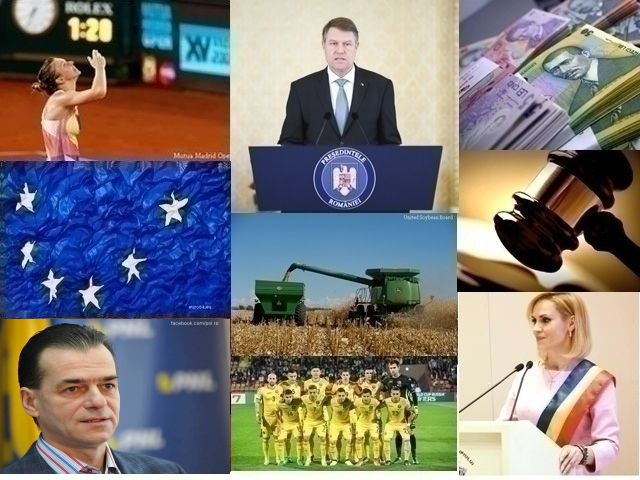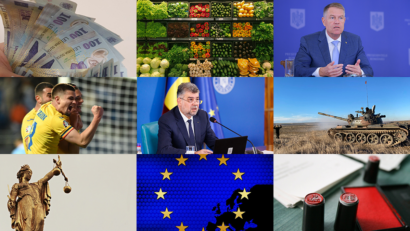December 2-6
A roundup of the week's main stories

Newsroom, 07.12.2019, 14:00
The NATO Summit in
London
NATO ended its anniversary summit marking 70 years of
existence with a message of unity, solidarity and cohesion despite divergences
reported in some Member States. In its final declaration, NATO reaffirmed its
defensive nature and its deterrence efforts, pointing out it will remain a
nuclear alliance for as long as such weapons still exist. NATO underlined it
will continue to strengthen its deterrence capabilities and will continue to defend
using an adequate mix of nuclear, conventional and anti-ballistic systems that
will be continuously adapted to changing realities. Attending the Summit in
London, President Klaus Iohannis said the summit was a success both to the
Alliance and for Romania, arguing NATO is the strongest alliance of all times,
having endured for 70 years with strong future prospects as well.
We’ve all agreed NATO needs a reflection process that
should identify a good strategy for the future of NATO. We need to identify who our enemies are,
where threats are coming from, how NATO should relate to the new world powers,
China for instance. We need to decide whether we need to change our approach to
Russia. Such questions were discussed and will undoubtedly lead to the elaboration
of an improved strategy.
The president said participants also tackled issues
pertaining to the Black Sea region, as well as intervention plans for the
eastern flank. President Iohannis announced cosmic space will be part of NATO’s
concerns for allied security.
President Klaus
Iohannis meets with EU Ambassadors in Bucharest
President Klaus Iohannis on Thursday met with ambassadors of
EU Member States in Bucharest. Talks focused on the agenda of the European
Council meeting of December 12-13, hot topics on the international agenda as
well as interior policy, the presidency reports. The President said he wants to
contribute to identifying solutions that should deal with the great challenges
facing the EU, such as combating climate change, migration, multilateralism or
citizen security. Klaus Iohannis also pointed out he wants solid and effective
European institutions, capable of generating results to the benefit of all EU
citizens. The President said the new European Commission will have to carefully
deal with the expectations of EU citizens by coming up with an action plan that
should implement the common priorities laid out in the 2019-2024 Strategic
Agenda of the EU, and that should ensure balance, unity and equity between
Member States. As regards the upcoming EU budget, Klaus Iohannis said the
priority is to reach an agreement so that the budget should be balanced,
respond to the new priorities of the EU as well as to the need to properly fund
traditional policies, such as cohesion and the Common Agricultural Policy.
The compensatory
appeal law has been repealed
The Chamber of Deputies in Bucharest on Wednesday voted to
repeal the compensatory appeal law. Originally designed by Justice Minister
Raluca Pruna, the law was passed in 2017 by the Social-Democratic ruling power.
It was meant to do away with the harsh sanctions Romania was handed down by the
European Court of Human Rights for its improper detention facilities. According
to the National Penitentiary Administration, some 23 thousand felons were
released from prison under the new law, of which 19,000 on probation. 2,300
reoffended and were sent back to prison, some of them having committed criminal
offences shortly after their release, others because they were being investigated
in other criminal cases at the time of their release. Justice Minister Catalin
Predoiu recently said the faulty elaboration of the law has endangered
citizens’ safety, adding that the Ministry he runs will be drafting a temporary
norm that will apply starting next year in all penitentiaries, whose precarious
situation has generated complaints at the European Court of Human Rights.
Authorities mainly want to improve the quality of detention facilities.
The Romanian Foreign
Minister attends the OSCE meeting in Bratislava
Romanian Foreign Minister Bogdan Aurescu attended the 26th
meeting of the Ministerial Council of the Organization for Security and
Cooperation in Europe (OSCE), on which occasion he reaffirmed Romania’s key
interests referring to security and cooperation. On the sidelines of the event
Bogdan Aurescu met with the Moldovan Minister for Foreign Affairs and European
Integration, Aureliu Ciocoi. Minister Aurescu pointed out Romania’s financial
assistance would not continue in its agreed form and will be adapted depending
on the concrete actions of the new Government, based on the bilateral Strategic
Partnership for the European Integration of the Republic of Moldova, as well as
on the democratic development and the country’s efforts towards European
accession. Romania’s support will continue to seek the interests of Moldovan
citizens and will focus on continuing the implementation of bilateral strategic
interconnection projects.
(Translated by V.
Palcu)




























